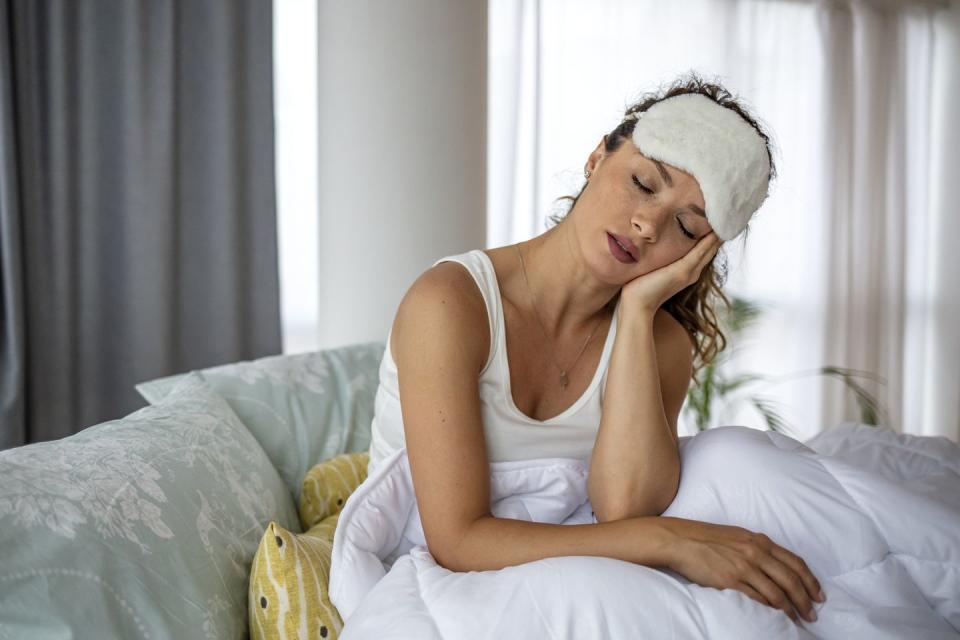This is what really happens when you don't get enough sleep

Babies and teenagers seem to spend most of their time asleep, while adults are often up at the crack of dawn. As we age, our need decreases, but we all require rest to recover from our daily lives. Most adults average eight hours a night to maintain optimum health.
But what are the health implications if you don't get enough shut-eye for a prolonged period of time? We spoke to the experts about what really happens to your health if you experience sustained sleep deprivation:
Why is sleep important?
A third of our lives are spent asleep. Theories suggest this long stretch of slumber helps to process and file information our brain has received during the day, while repairing and rebalancing the body both mentally and physically.
'Sleep is an active period where a lot of processing, restoration, healing and strengthening occurs,' says Maryanne Taylor, founder and sleep consultant at The Sleep Works. 'Research has shown that sleep influences all of the body's major physiological systems, including our immune system and also impacts on our mental health, weight and overall quality of life.'
'Sleep helps us to consolidate our memories,' she adds. 'Our brains process a huge amount of information each day and while we sleep, parts of the information are transferred from short-term to long-term memory. We require a long period of sleep to restore and rejuvenate, grow muscle and repair tissue in order to maintain optimum health.'
Sleep also helps us maintain the function of our immune system. 'When we have an infection, one of the things our body does is release chemicals that promote sleep,' says Joanne Rodda, consultant psychiatrist at Re:Cognition Health. 'There is some evidence to suggest that people who respond to infection by sleeping more may have better outcomes from their illness, and sleep deprivation has been clearly shown to have negative effects on the immune system. Quite how sleep helps our immune system to function is not yet known.'
What happens if you don't get enough sleep?
The penalties of sleep deprivation are incremental, and will get worse until something changes; an occasional bad night might mean you are irritable, while several can affect your concentration and mood.
But it is the accumulation over weeks and months that can lead to more serious health complications such as high blood pressure, obesity and diabetes. Here's what really happens to your body after one, a few and many sleepless nights:

One night of no sleep
If you lose one night's sleep you might find you have a short temper, can't focus and you feel tired and irritable. You may also want to eat more.
'Sleep is a highly complex process designed to restore our bodies and minds through four phases that are repeated throughout the night forming the sleep cycle,' says Dr Sally Norton, NHS weight loss consultant and health expert at Vavista Life. 'These phases are vital for muscle repair, memory consolidation and release of hormones regulating growth and appetite.'
According to Dr Norton, when we don't get enough sleep we are likely to struggle in the following ways:
We are less able to concentrate.
We can't make decisions or even control our own hunger.
We are more likely to overeat more the next day (around 300 calories worth) in an attempt to get an energy fix.
Studies even suggest that poor sleep may contribute to conditions like heart disease, diabetes and Alzheimer's.
A few nights of no sleep
After several nights of poor (or no) sleep, you might find it harder to concentrate and make decisions, and you are more prone to accidents. You might also feel down and blue: chronic sleep deprivation may lead to long-term mood disorders like anxiety and depression.
'When people have disturbed sleep, the effect this has on how we feel the following day can be extremely noticeable in both our physical and emotional health,' says leading sleep expert Dr Neil Stanley. 'Good sleep is as important to good health as diet and exercise and so it is important to try and get good sleep each and every night.'
A few weeks of no sleep
A sustained period of sleep deprivation can wreak havoc with your health. Just one week of sleepless nights and you will likely have zero tolerance, your sex drive will take a nosedive and your cognitive function will suffer.
'If you don't sleep you will be lazy, lethargic, sugar cravings kick in, decision making is totally erratic and a feeling of instability ripples through you,' says Jerry Sargeant, a life enhancement coach. 'Your mind becomes shaky, fuzzy, clouded. It's hard to concentrate therefore functionality and performance in business or in sports can be as low as 5-15 per cent of its optimum.'
The health implications of sleep deprivation
A prolonged lack of sleep can affect the immune system, meaning you're prone to picking up coughs and colds. It can also affect gut health, says nutritional therapist Claire Barnes: 'It is important to realise that chronic disruption of our circadian rhythm can have detrimental effects on our health.'
Not getting enough shut-eye on a regular basis is also associated with increases in heart rate and blood pressure, and could increase the risk of obesity. People sleeping fewer than seven hours a night tend to gain more weight and have a higher risk of becoming obese, studies suggest.
It is believed that people who don't sleep enough also have reduced levels of leptin – the chemical that makes you feel full – and increased levels of the hunger-stimulating chemical ghrelin. The way the body processes glucose is also altered by a lack of sleep, meaning those who sleep less could also develop type 2 diabetes. So there you have it. Sleep is incredibly important for both your physical and mental health.

6 tips to improve your sleep
Many people believe that the answer to not getting enough sleep is to take sleeping tablets. Unfortunately these can have significant adverse effects including becoming dependent on taking them, increasing the risk of falling, being fatigued in the day and becoming less effective the longer they are taken. If you suffer from insomnia it is better to try to use non-drug options. Useful lifestyle tips for perfecting your bedtime routine include the following:
1. Practise relaxation
Try using relaxation techniques such as breathing exercises or meditation and download a sleep app.
2. Try CBT
Cognitive behavioural therapy (CBT) can be helpful in reducing anxiety and patterns of thought that may be keeping you awake.
3. Stick to a routine
Going to bed and getting up at the same times - even at weekends - helps establish your body into a regular pattern of sleep.
4. Exercise in the daytime
Get plenty of exercise in the day to reset your circadian rhythm, but avoid high impact exercise just before going to bed.
5. Sleep hygiene is key
Keep the bedroom at a comfortable temperature, invest in a good mattress and switch electronic devices such as mobile phones and laptops off before going to bed.
6. Sidestep stimulants
Avoiding drinking caffeine or alcohol in the evening, and aim to leave a gap of 2-3 hours after eating before going to bed.
You Might Also Like

 Yahoo Finance
Yahoo Finance 